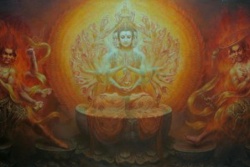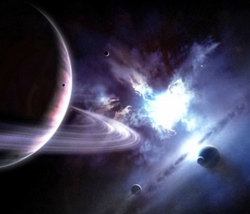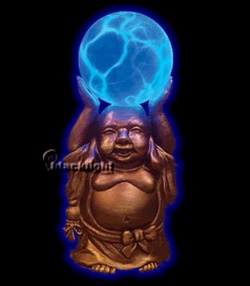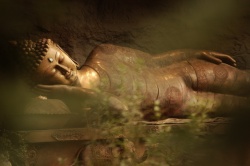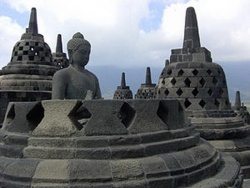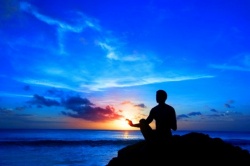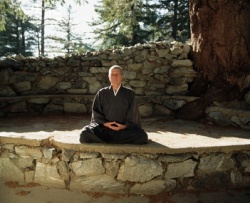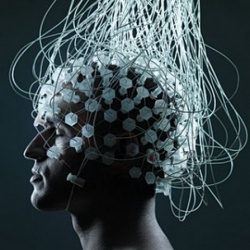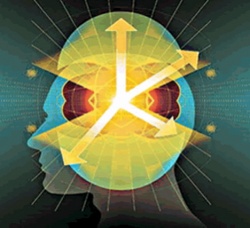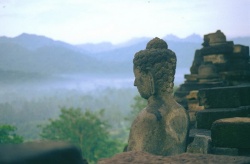Buddhist Cosmology by Brian Ruhe
“God is Dead”, read the headlines on the New York Times on a Christmas day in the 1970s. Literally speaking, the New York Times was wrong. But the truth is something else. Cosmology is defined as the theory or philosophy of the nature and principles of the universe. To a Buddhist who affirms his choice of going for refuge in the three gems of the Buddha, his teachings, and the community of fellow Buddhists, Buddhist cosmology explains the ground under one’s feet and the Hubble space telescope’s discoveries. The Hubble space telescope is an instrument that helps to support the Buddha’s teaching because it has the technology necessary to finally confirm what Siddhartha Gotama Buddha started teaching 2587 years ago in northeastern India.
Every particle of matter in the entire universe, seen and unseen, is accounted for in Buddhist cosmology. The Buddha left no stone unturned up to the point of certain questions that he refused to answer. Any astronomer who has not studied the Buddha’s teachings on the physical universe has not done his homework, and he cannot claim to have adequate knowledge about the history of the science of astronomy. In Carl Sagan’s popular ‘Cosmos’ television program in 1980 he had an episode describing how science and religion were so far apart on their views. Then, he adds a little footnote saying to the viewing audience that eastern religions are closer to science’s view of astronomy. Then he just left the audience hanging by not admitting what the Buddha and the Hindus taught! But much of their viewing audience was the American Bible belt so I can understand that the advertisers did not want to lose money over the subject.
The Buddha’s description of the physical universe comprise some of the most astounding teachings he ever gave. It’s right up there with no self and no god. I can still remember the chair I was sitting in (it was a love seat actually), in 1994 in Thailand when I read that the Buddha was the progenitor of the big bang theory. Actually, the Hindus may make the same claim as they teach this as well. History is uncertain about what happened first in India because Indian history is notorious for not being too concerned about history. It’s a nightmare trying to figure out whether any of the Upanishads actually predate the Buddha, or what. Then there’s religious one-upmanship which blows away objectivity. Anyhow, during my innocent boyhood years in the 1970s my father told me about this new theory called the big bang theory. He said that astronomers have almost completely proven that the universe blew out from a single point smaller than my thumb! It blew out and will likely collapse in again, maybe 40 billion years later, or it may dissipate into entropy. There’s more on this in the chapter ‘All Universes Mythology.’ The Buddha said that over vast periods of cosmic time ‘Island Universes’ form. This almost blew me out of my love seat because those are galaxies! Anyone could have guessed the existence of stars and planets 2587 years ago, but there is no way that with the naked eye you could guess the existence of galaxies! No way. It was through the Buddha’s direct realization. Being enlightened, he could see the big bang as easily as you observe your little finger. Buddha described solar systems as world systems and planets as world spheres. Compare that to the book of Genesis in the Bible that has a cosmology that dates back to the fourth millennium B.C. I couldn’t live with that! I don’t know who can.
The Six Realms
Beyond the physical universe, the Buddha and thousands of his enlightened lineage holders explained the dharma (Buddhist version of the truth) of the unseen dimensions, or realms of existence. This explains a lot of things in world history and in your own personal inner life and past. Let’s take a look at these realms of existence. There are six realms of existence, three higher realms and three lower realms. The Buddha taught that every sentient being in the universe lives in one of these six realms. This is samsara, the wheel of life, the continual running on from life to life, like a monkey who jumps from tree to tree never finding fruit. The characteristics of samsara, the wheel of life, is continuous struggle, fear of death, ignorance of birth, and the repetition of that struggle. The six realms in the wheel of life are shown opposite.
Above is a blow up of the god realm as described by the Buddha in the sutras. The six lower heavens of the sensuous sphere have a hierarchy to them and are all occupied by devas which include the jealous god realm. Only asexual devas reside in the fine material and formless spheres.
It may be best to first relate to the six realms as states of mind. On any one day you may go through all six realms as a state of mind. The hell realm is characterized as constant anger and aggression. You get angry at people so they get angry at you. This makes you even more angry at them so they get even more angry at you. This vicious circle becomes a living hell. People who’ve been through a few marriages don’t have to die and go to hell to know what it’s like; this experience exists on earth right now. The animal realm is characterized by ignorance and the symbol is a pig. A pig just eats everything in front of its nose, not looking right, not looking left. He doesn’t care if he’s eating garbage or caviar or expensive chocolates, he just stubbornly eats and eats and eats. Ignorance means not paying attention to the signals that life is giving you, being stuck on your habitual patterns, too comfortable and cozy with your old way of doing things. Such people can be quite intelligent in their ignorance. They think of clever ways to convince you to adopt their habitual patterns. “You should join our political party.” “You should come to the pub with us after work. A bit of alcohol is good for your health.” There is also the absence of a sense of humour because animals cannot appreciate irony. The comfort zone is the single biggest enemy of human potential. The tendency to stay with what is comfortable is the animal realm mentality. There’s no challenge to it. Oscar Wilde said, “Only the shallow know themselves.”
The hungry ghost realm is one of poverty mentality. You can’t get enough money, you can’t get enough sex, you can’t get enough love or attention, or stamps for your collection, whatever. Even if you get what you want, it’s as though you’ve fallen in love with being hungry and you would rather still be hungry. The symbol of the ghost realm is of a ghost with a pinprick mouth, a long skinny neck and a huge ravenous belly that is always hungry. No matter how fast he eats 25 hours a day, he can never be satisfied.
In the higher realms, the human realm state of mind is characterized by passion, discriminating passion. You want your coffee with cream, not milk, and just a little bit of sugar. You’re very particular about the clothes you wear. Humans want to be more, do more, have more. Their ego is striving for growth and expansion. That’s discriminating passion. Animals don’t have that. Once they satisfy their needs to eat, sleep and procreate, they just lay down and sleep and/or die.
The god realm is characterized by bliss, a blissed-out state of mind, where everything seems beautiful and wonderful but you may be turning away from the suffering of others. In The Rose, Bette Midler is a star proclaiming, “That’s enough about me, let’s talk about you. What do you think about me?” The self stuck absorption of the god realm state of mind is not the ideal state for cultivating the tender heart of compassion. This is not to say that all devas are full of themselves.
The jealous god realm is a paranoid state of mind, the paranoia and power of highly attained beings that do not want anyone to be better than them. Adolf Hitler was a jealous artist and he hated artists that were better than him. He persecuted and killed other painters in his fits of jealousy. Vice-president Lyndon Johnson is an example of the asura (jealous god) mentality. He was well known for his huge ego and ambition. He was clawing for the presidency and wanted it very badly but John F. Kennedy beat him out at the 1960 democratic convention. Johnson hated Bobby Kennedy and who knows how he felt about President Kennedy as he withered powerless in the vice-presidency. It was Johnson who first asked President Kennedy to go to Texas. The controversial evidence is believable that Johnson conspired to kill Kennedy so that Johnson could fulfil his power craving to be the President of the United States. He succeeded but people close to Johnson were surprised to notice that once he got to be the president, it seemed as if he didn’t want the job. He craved for the power but being fed did not make him happy, like a hungry ghost. He was still unsatisfied. Perhaps his mind set was a combination of the hungry ghost and jealous god realms.
Two years later, before the Vietnam war unravelled him, Johnson said “I’ve never felt freer.” This was a period for him to earn good karma before his murderous karma caught up to him. He was described as the most effective president in history because he mastered the exercise of power. He power tripped all over Congressmen and Senators. He was a manipulator extraordinaire, he had to be on top, just like a jealous god. His best friends said that he could be the biggest friend in the world, hugging people, then in the next minute he could hate his enemies with a mean sadistic streak, like Jeckle and Hyde! But isn’t this natural? Johnson truly hated Bobby Kennedy and Johnson said that Bobby Kennedy probably would have hated him for watching him die on TV, as Kennedy lay bleeding on the floor of the kitchen in the Ambassador Hotel in Los Angeles. Beyond doubt Bobby Kennedy was killed by a conspiracy and Johnson may have had a hand in that too. LBJ’s beneficiary and close ally, FBI Director J. Edgar Hoover, another jealous god, was according to researchers, the man most singularly responsible for John Kennedy’s assassination. Hoover was the sovereign monarch of the FBI kingdom for over 40 years, with a god-like inflated opinion of himself. Not only is this a reasonable conclusion according to the evidence, which is not appropriate for this book, but this injustice is also in harmony with the Buddhist cosmology teachings. The Buddha taught that the jealous gods just cannot bear to witness devas of more virtue so they attack them but the jealous gods always lose in the end. The psychological effect of the Kennedy concept in the mind is that the Kennedys represent the former virtue of our collective past so people try to model themselves after that; they’re haunted by it. It is that virtue or just the idea of virtue, that the jealous gods can’t stand. Johnson and Hoover were just human beings acting in harmony with the devas around them, or acting as the instrument of devas around them.
The autopsy revealed that Senator Robert Kennedy was shot point blank, within two inches from behind, upwards at a 70 degree angle. The supposed assassin Sirhan Sirhan fired what sounded like blanks from three feet in front, according to witnesses. Sirhan was a brainwashed decoy who later couldn’t remember a thing. An expert studying the RFK autopsy report said “By god! I felt the cosmos shake!” It is very suspicious that standing closest behind Senator Kennedy was last minute “Ace Guard Service employee” Thane Cesar and also Bill Barry, who were both armed with hand guns, which were drawn. Bill Barry was an “ex-FBI” man who was ostensibly serving as Kennedy’s bodyguard. Barry was the man who led Kennedy off of the stage in the opposite direction planned!
Earlier a young woman and a young man, both about 22, brought Sirhan into the pantry from the back stairs. The young lady was wearing a white dress with small black polka dots as she spoke with Sirhan right up to the moment before Sirhan turned on Kennedy. This couple, described below, were seen running after the shooting. A policeman who rushed to the scene said:
“Right away, an older Jewish couple ran up to me, and they were hysterical. I asked them, “What happened?” The woman said that they were coming out of the Ambassador Hotel by the Embassy Room, when a young couple in their late teens or early twenties, well dressed, came running past them. They were in a state of glee.
They were very happy, shouting, “We shot him! We shot him!” The older woman asked, “Who did you shoot?” The girl said, “Kennedy, we shot him! We killed him! This put this old Jewish woman into hysterics. She was still in hysterics at the time I talked to her.”
Please forgive the author for dwelling upon so many Kennedy examples in this book. Because the general public doesn’t know the above details, the purpose of using this example for the jealous god realm mentality is to help those determined citizens who want to release Sirhan Sirhan from jail and reopen this case, by raising awareness about this huge lie and conspiracy which exists in our shared history. The subsequent cover up and evidence tampering indicates that the FBI was behind RFK’s murder. J. Edgar Hoover got away with it again! but in which realms are he and Johnson now?
Robert Kennedy was “running for President to take the Americans out of the Vietnam war,” he said. He swore he would stop the war. It is a very reasonable possibility that it was a national security decision to assassinate Robert Kennedy. There is also evidence that Martin Luther King Jr. was killed two months prior, by J. Edgar Hoover’s orders, for the same reason – because of the Vietnam war. King was the most influential world figure to speak out against the war, as early as 1967. The evidence for the national security connection is right on the Internet. Just type each of the names of these great leaders into the search engine, and it’s all there. Not believing everything I read on the Internet, I found the name of Lynn Mangan on Robert Kennedy’s site and I phoned her many times in Nevada. She has been working for twenty years as Sirhan Sirhan’s researcher and she feels confident that they will get him out of jail, but they could use your help and publicity. Lynn knows Sirhan is innocent and she knows the details of the murder better than almost anyone alive. She told me that there was something scandalous, absolutely scandalous in the official record of the Kennedy assassination. “And this is the official record!” Lynn told me emphatically but she refused to divulge what it was. Retired OSS/ CIA agent William Harper deserves the credit for discovering this, Lynn said, and he tipped her off about it before he died. Otherwise almost nobody would know about this today. This intrigue reads like the jealous god realm.
We don’t know who or how many people were behind J. Edgar Hoover’s actions but I admit that military security must always come first in any country. The military is the first organizing principle of society. Without the military your very existence is in jeopardy. I agree with the right of American national security to kill anyone in the country if they feel it necessary to protect the lives of 250,000,000 Americans. That doesn’t sound very Buddhist but maybe it is. Compassion means that the needs of the many outweigh the needs of the few or the one. I believe that the assassination of President Kennedy was also because of the Vietnam war. I believe that these three big assassinations were all a mistake, an error in judgment, and they should be forgiven. This is not a time for conspiracy theories and retribution. This is a time for understanding our vital past and having wisdom and forgiveness for the mistakes people made out of fear and ignorance. Just let it go… and let Sirhan Sirhan go, after 34 years in prison! The future is more important than the past so it is better not to hurt people’s confidence in the government. Better to just do what is right now, rather than blaming people who are still alive. Forgive everyone involved. Grant them amnesty.
President Johnson’s karma in the Vietnam war cannot really be forgiven nor granted amnesty. Buddhism isn’t about forgiveness so much because the laws of karma don’t function on forgiveness. You can forgive someone for wrongdoing but the law of karma comes back to them as a natural law, regardless of who forgave who for whatever. Johnson’s weighty negative karma during the Vietnam war, “not wanting to be the first President in American history to lose a war!” rebounded upon him and he said that his life was a “waking nightmare.”
Having considered the six realms as states of mind, next, you reveal to the class that these are real realms, like dimensions where real beings actually live. The animal realm and the human realm are the only ones you can see with the naked eye. But if someone had a radio that could only pick up two stations, he may say that his radio gets all the radio stations in the city, but that is wrong. Because of the lower concentration of our minds, we do not have the mental energy normally, to sense the other four realms. The word concentration is synonymous with the word energy. The Buddha saw all realms of course, and he described them in great detail for us, as did the lineage of enlightened ones. The god realm is divided into the sensuous sphere, the fine material sphere or Brahma world (Brahmaloka), and the immaterial or formless sphere. The sensuous sphere is comprised of six lower heavens. In the Theravada canon, the Buddha expounded at length the nature of each of these six heavens. Western Buddhists generally have no idea about this, but it is a fact that the Buddha felt that it was important for him to tell us all about these things that ordinary worldlings cannot perceive. Practically every third sutra has devas involved. They’re all over the place in the scriptures. Because Westerners rightly regard Buddhism as meditation, which is good, they generally have a lopsided view of what is in the content of the Buddha’s words. At Douglas College, I discussed devas with philosophy professor Leonard Angel and he believed that the Buddha was being metaphorical in referring to devas. Perhaps the Buddha was being polite to the pre-Hindu beliefs of the day, and maybe devas don’t really exist at all, he felt. Dr. Angel tries to synthesize modern scientific ideas with the enlightenment quest in his book Enlightenment East & West. I cannot accept his view that devas don’t exist because that is far more unbelievable than believing that devas do exist. Consider the big picture of death, rebirth, karma, and the six realms of existence. If devas don’t exist, which is to say that the god realm does not exist, no heaven, then what happens to virtuous people after they die? If they come back to human birth, if people believe that, then why is it unbelievable that they could take rebirth as a deva in the god realm? It is an accounting nightmare to try to erase any one of the six realms. The law of karma is the law of karma. We have got to have these six destinations in order for the whole universe to hang together properly. Buddhist cosmology all hangs together in one whole system that works and makes complete sense. No one just made this up you know, conventional reality truly is this way. Practically all religions have devas so they indirectly confirm each other and the truth that there really is some objective reality which is reflected in all of these similar religious views. This isn’t just the wishful thinking of people that want to live after death. Guardian angels, heavenly hosts, ascended masters, guides, spirit guides—they’re all names for devas. Devas are not enlightened as a rule, and humans are not enlightened as a rule, but like humans it is still possible for a deva to attain to full and complete enlightenment.
The first heaven of the sensuous sphere is ruled over by four principal devas. They are the king of the north, south, east and west. The second heaven is Tavatimsa heaven which is ruled over by Sakkha, king of the gods, he is called. This heaven is better than the first one. The Buddha told a story about an ordinary king who had a virtuous minister. The minister was a very compassionate man and he helped many people. They both died and went to heaven. The king took rebirth as a deva in the first heaven. He lived in a celestial palace but it was kind of dull and unexciting. He could perceive that his former minister took rebirth as a deva in Tavatimsa heaven. He objected, thinking “Hey! I was the king. How come I’m stuck here in this boring heaven while my minister gets a better rebirth up there in Tavatimsa heaven?” Then, he realized that he wasn’t that generous or caring as a king, so the minister deserved a better rebirth than he did. This story illustrates the difference between these two heavens. The second heaven is mentioned by the Buddha more than any other heaven, perhaps because it is closer to Earth and our worldly affairs than the higher heavens. Sakkha came down many times to visit the Buddha and he is referred to more than any other deva in the scriptures, including Brahma. Sakkha rules in a celestial palace with thirty three principal devas in his administration. This heaven is called the gods of the thirty-three. When Buddhists say ‘gods’ they mean devas. Sakkha is very virtuous in character but a bit slow, you might say. Sakkha rules for his lifetime which is generally one kalpa long, so he has a temporary administration like the president of the United States. After he dies and takes rebirth elsewhere, another Sakkha will come along to replace him. Life in all six realms is impermanent. The Jataka Tales, the 572 past life stories attributed to the Buddha, are full of the heroic deeds of Sakkha appearing in the sky above the Earth with great brilliance, to save the lives of a hero or heroine being picked on by some wicked king or other. In Sanskrit, ‘Sakkha’ translates as ‘Indra,’ which is a more familiar name to people. The existence of this Hindu god was confirmed by the Buddha. The Buddha’s cousin and senior disciple Anuruddha was Sakkha in a previous life and Anuruddha had the noble bearing of a king. Lots of consorts, sex and devis in Tavatimsa. Not a bad choice for rebirth, eh?
Shortly after enlightenment, the Buddha spent one rainy season retreat in Tavatimsa Heaven teaching the dharma to his mother and to the millions of devas present. Nice son. This is where the Buddha’s mother went after she died, a week after Prince Siddhartha was born. This is the tradition for the mothers of the Buddhas of the past and the mothers of the Buddhas of the future. The third heaven is Yama Heaven, a heaven of bliss, also called the heaven of no attack. The fourth heaven is Tushita Heaven, another very popular vacation spot. This is the heaven with the number one greatest amount of sensuous pleasures—sex, drugs, rock ‘n roll. This is where Prince Siddhartha lived as a deva prior to his birth because this is the traditional residing place of the Buddha-to-be. Today, the Buddha taught, the future Buddha of Compassion, Maitreya is currently a deva residing in Tushita heaven. He is awaiting the proper causes and conditions on Earth, to take rebirth (usually in India). Buddha prophecized that Maitreya would become the fifth Buddha in this kalpa (age) approximately 5000 years after the Buddha’s time. Buddhism must first be wiped out from the world in order for the next Buddha to arise. This will happen. That is how kalpas have always gone.
The Buddha was Buddha number four in this particular kalpa, which is a big string of Buddha’s to have in one kalpa! Aren’t we lucky. Tushita heaven is more formless, or less structured than Tavatimsa. Tavatimsa heaven is a heaven of order. Heaven’s first law is order; earth’s first law is order as well. In the fifth heaven the devas delight in the power of creation. In the sixth heaven the devas delight in the power over the creations of others. That means that the devas of the top heaven have power over the devas of the lower heavens, as well as the rest of the sensuous sphere, which includes all five of the lower realms. The greatest jealous god deva of them all is Mara and he lives on the outskirts of the sixth heaven. Mara is the ultimate embodiment of ego and the symbol of Mara is Darth Vader from Star Wars. Darth Vader was highly attained spiritually. His powers of concentration were so mighty that he killed people with his mind. Mara is the Buddhist equivalent of the Christian devil, Satan. The Bible says that Satan was one of seven angels but he was bad and challenged god so he got cast down into hell and rules over hell. The Buddha teaches that Mara lives in the comfort and indulgence of heaven but has administrative powers over hell and all the rest, except for what is above the sensuous sphere. The good news is that the jealous god realm devas cannot penetrate up to the fine material sphere. All those devas are virtuous devas. The jealous god devas are mixed together with the good devas in the sensuous sphere and they have their cosmic battles going on. Sakkha once paid homage to the Buddha by saying to the Buddha that when they have wars with the asuras, they drink asura nectar, but the taste is not one sixteenth as sweet as the taste of the Buddha’s dharma. This conjures up images of vast cosmological battles going on in the upstairs above our heads. This is actually the truth. This is what is really happening all around us but we just can’t see it.
‘Seventh heaven’ is a quantum leap up from the sixth heaven. Now we are into the big time—the Brahmaloka. These are the greatest, vastest, god-like devas in the entire cosmos! This is where Brahma lives for a life span of one whole cosmic cycle—100 billion years by one translation of the abhidharma. He is the first deva born into this universe from the world of radiance, after the big bang. Brahma believes that he is god because he is there alone for so long that he forgets his birth and assumes that he created the universe. After a few eons go by he wishes for company and he believes that he creates the other devas that later appear (by the process of their own karma). Those devas also believe that Brahma must be god and they all share this mistaken assumption that Brahma is the one and only absolute creator god, until some Buddha comes along and taps Brahma on the proverbial shoulder and tells him that he is not an absolute almighty god, he’s just a deva. Brahma has an ego! Brahma is limited by the self, self consciousness. An enlightened person, the Buddha, is higher than ‘god’ Brahma. Brahma is the Hindu god and he lives within the first three of the four layers of this fine material sphere.
Not all of the devas are Buddhists. Many devas have a theistic relationship with Brahma, believing that he is god almighty. Sakkha told the Buddha about a time when Brahma paid them a visit at his celestial palace. He was sitting around the big table with the gods of the three and thirty when suddenly a beam of light came down. They immediately knew what it was so they perked right up and said “Brahma’s coming! That’s the signal!” Out of the beam of light appeared a gandarbha, the lowest level of the devas. The Buddha described 28 classes of celestial beings. Brahma is such a high god that he can’t even relate directly to the devas of the lower sensuous sphere, let alone mere human beings. So Brahma creates an intermediary and he sent this gandarbha described as Five Crest. Each of the devas of the thirty three believed that Five Crest walked up to only them, but this was an illusion created by the vast mind powers of the god-like Brahma. This is what Sakkha described on one of his many visits with the Buddha.
The single most shocking thing about Buddhism is it’s teachings about non theism. This is much deeper than it seems. Non theism is defined as believing that there is no such thing as a personal, almighty god or gods. This is true. There is no such thing as a separate, personal god. When theists, like most religious people in the world, hear that Buddhists don’t believe in god, the typical reaction is no big deal. People can believe whatever they want. That’s no threat. In Judaism, the Jews say that there is no name for god. In the Christian tradition, as well as the Muslim tradition, they share the same god as the Jews because they all have their root in Abraham of the Old Testament. The same one almighty god, they believe. The Muslim name for god is Allah and the Christian name for god is Jehovah. This name comes from the meeting of minds that Moses had up on Mount Sinai, with god. Moses experienced or they claim he experienced seeing a burning bush. He asked the burning bush “What are you?” The burning bush replied to Moses “I am that I am.” This is generally regarded as being the definition of god. The Hebrew words for “I am that I am” sound something like “Jehovah,” hence the Christian name for god. The Christians chose to name god, the Jews had a good reason not to.
God
A Buddhist interpretation of Moses’ experience with the burning bush is that it very possibly happened exactly the way Moses said that it did. But the scariest thing about the entire Buddhist religion is that Buddhism does not refute the existence of Jehovah. Buddhism recognizes that Jehovah could exist as one of the great brahmas in the fine material sphere of existence. That’s the big scary news. Buddhism has subjugated god! However if we compare Old Testament ideas about god with New Testament ideas about god, Buddhists can see that the people who wrote the Bible had confused ideas about god. They could have had genuine encounters with devas of the higher realms. Here one deva, there a completely different deva; and they attribute everything to one almighty god. It is being generous to say that Christians have a god in the Brahma world. They may instead have a lower god or gods relating to them. Who knows? Worse still, is the fact that if there is brahma, a ‘god’ Jehovah, he has to step aside for the biggest deva in the entire universe: Brahma. The Brahma is the Hindu god and he’s much bigger and more powerful than a lesser, weaker Jehovah. More details about this are revealed in the book Buddhism Explained by Phra Khantipalo. In principle Moses could have had a deva experience, but the anti-mythological eye of history states that this famous story about Moses never happened. It was something that the Judaism of 700 B.C. attributed to Moses who lived about 1200 B.C. In the ten commandments, which was supposed to have been given to Moses from god on Mount Sinai, it says that the Sabbath day must remain holy. But Moses was an Egyptian and they didn’t even have a Sabbath day until Judaism was more established, about 700 B.C. So, many fictional stories have been attributed to Moses just as Confucius has been the venerated subject of many fictitious teachings as well.
Devahood is like the idea that if you are good, when you die you will go to heaven. This is true in many cases, according to Buddhism, so that’s how you become a deva. Buddhism has subjugated the Hindu religion as well as any other theistic tradition, in this way. Buddhism reveals that there is a seed syllable for some deities, or vaster, god-like devas such as Brahma. Seed syllables represent the root name for such a being; seed syllables such as OM or HRI, etc. The Venerable Chögyam Trungpa Rinpoche said that the seed syllable for Jehovah has always been kept a secret by the Jews because they were afraid that some yogi might come along and subjugate god!
The Buddhists claim that the ultimate state of enlightened mind is above the personal limitation of a self or ego which is what is still limiting ‘god Jehovah,’ Brahma, and most other celestial devas. They are not generally enlightened in the upstairs. They’re greater than we are, but they are not god. If you attain to full and complete enlightenment in this very life, then you will be bigger than god Jehovah himself. Technically, that is literally the truth from a Buddhist view. There’s no such thing as god but there are plenty of powerful devas that we should relate with. People just make the mistaken assumption that if they supplicate a deva, then it must be some kind of almighty god, or Jesus Christ. Some Christians attribute every single higher realm manifestation that they experience to Jesus. That’s not fair to the countless other devas pulling their weight. That’s like saying that President Roosevelt single handedly ended the depression and won World War II, without any help at all! Praise Roosevelt! So, a Buddhist interpretation of the virtuous and caring Moses, is that the wise man made a mistake and assumed that the burning bush was a manifestation of ‘the one god.’ If Moses could have somehow looked up, on the proverbial left hand or right hand side, he may have noticed Brahma and some other great big devas up there too, seeing that Jehovah was not much of an almighty god after all. This explains a lot of other misunderstandings in history as well. The more you study and test out Buddhism, the more everything seems to hang together and make sense. The deeper you dig, the deeper you are. Phra Khantipalo’s theory about Jesus and Mohammed is that they may have been devas in their previous lives. In deep meditation they recalled only their last life and believed that they did in fact know god. If they knew Jehovah in their previous life as a deva they could have made an honest mistake and believed that Jehovah was a one and only almighty god. Fired with this inner conviction, they could have gone out and taught a false assumption with true sincerity. It’s possible. In the lower realms, the ghost realm is inhabited by real ghosts, like the ones in your living room and closets at home. They were probably unhappy people that have died and they are characterized by poverty mentality. The hell realm is rock bottom in samsara. Hell is not at all a popular subject in the West, however it is not logical to believe that hell does not exist simply because it is unpopular. The Buddha described hot hells and cold hells, hells of moans, hells of screams and hells of indescribable filth. In Buddha’s description of one hell, he said that it was like a man going into a shop which provides wheat. There are eighty bushels of wheat and once every one hundred years he takes one grain of wheat and walks away. Then a hundred years later he comes back and takes one more grain of wheat, and walks away. The amount of time it would take him to empty all of the bushels of wheat is the length of time that beings stay in this particular region of hell. Then Buddha went on to explain another part of hell where beings stay ten times longer than that! So Buddhism is not some new age trip of love and light and mush, oozing out everywhere. There really is a hell, sorry. Buddhism actually props up some crucial Christian religious beliefs. Christian purgatory could be called the hungry ghost realm.
Meditation Practice and Cosmology
The formless sphere is the top four layers of samsara. Here, these mental beings have no form at all, no skandha of body. This is kind of a spiritual dead end street because they need to come down to a lower level, like human, to get enlightened. I have a colleague who has entered into samadhi states. In a samadhi one’s consciousness is automatically at the level of the fine material sphere, or the level of the formless sphere. During my colleague’s samadhi states, his mind has moved about amongst the form and formless levels. To date I have not yet made it to a samadhi. During the final phase of my month retreat, which was a necessary initiation before ordaining as a monk, we were instructed to make a great effort to attain samadhi. In the Mahasi Sayadaw tradition, I reached what is called the ‘arising and ceasing of phenomena,’ where you feel pin prick sensations all over your body. At first I thought there was an ant crawling on my knee, but then I realized that this was what I was waiting for. This is a stage prior to what the Buddha called ‘neighbourhood concentration,’ which occurs before a samadhi, the samadhi being like getting sucked into a black hole.
This information is included in this chapter on cosmology to relate the deva world to our meditation practice. Cosmology is not some far out thing that you will have to wait until after you are dead to validate. Also, in the chapter ‘How to Invoke Devas’ we will practice techniques to actually relate with the devas and bring down their blessings into our lives. So, this is practical Buddhism, not science fiction.
There are eight layers of the god realm corresponding to the eight samadhis in total. Your meditation experience relates directly to the most far out mystical regions of Buddhist cosmology. It is not as though the higher regions of heaven have nothing to do with you. Ordinary people are having samadhi absorptions today, just because they are putting time and effort into their practice, as you could be. The top four layers of the eight are the four layers of the immaterial sphere. These are the sphere of infinite space, the sphere of infinite consciousness, the sphere of nothingness, and the top layer of heaven, the top layer of samsara, the sphere of neither perception nor non perception.
In Tibetan Buddhist traditions it seems that they don’t emphasize the samadhis that much but they emphasize formless meditation. This may be because the Theravada Buddhist tradition was the first to dominate the market with the samadhi product. Because the Mahayana and Tibetan traditions exaggerate their claim to being superior to the Theravada Buddhist tradition, this indicates a possible motive to distort the Buddha’s emphasis on samadhi in favour of their sectarianism. Probably most Buddhist traditions north and south are guilty of putting truth second to their claims of the superiority of their own tradition. If the northern school admitted that the Buddha taught the importance of samadhi as much as the Buddha really did teach the importance of samadhi, then they would be bowing in line behind Theravada Buddhism. This is unacceptable to them. I have heard Tibetan Buddhists say that Theravada Buddhists mistakenly get stuck on samadhi and attach to the flavour of samadhi. Such an accusation is a form of aggression. On the other hand, in Thailand I lived with an Australian Theravada monk who accused the Mahayanists of getting stuck on samadhi. The reason for this confusion is because the scriptures do warn you not to get attached to samadhi, but this has nothing to do with any particular Buddhist tradition or lineage.
The eight levels of these heavenly spheres are full of devas, countless trillions of devas. The fictional Mahayana Atavamsaka sutra is considered by many to be the greatest religious text ever written by man. In this sutra it states that there are as many devas as there are atoms in the Buddha universes. One gets the impression of a deva administration with one or more devas assigned to watch over you in particular. Perhaps your devas are talking to your boss’ devas and they are asking those devas to influence your boss into giving you what you want. If you know some appropriate chants, such as in the chapter on invoking devas, you can better your chances of success by using them. That’s how Buddhist cosmology can help your life in practical, down to earth ways. Manuals on effective job hunting techniques should include Pali and Sanskrit chants. These chants have worked to get this book published. It is useful and practical to know the cosmological view of the universe and how to better your place in it.
An analogy to understand the devas is that you think of a man sitting on his bed, playing with a cat. He puts his hand under the sheet and wiggles his finger to get the cat’s attention. The cat adores him so when it sees the imprint of his fingernail through the sheet, it pounces on his finger and gives him a love bite. Think of the bed sheet as the surface of the Earth with over six billion people. When a person chants to the devas he is like the finger wiggling to get the attention of the devas. The cat is like a deva in the sensuous sphere who loves human beings and responds to their needs. It’s not so easy to see a person down there unless they wave a flag or do something to get attention. The devas single you out for help, out of six billion other people because you did a Buddhist deva invocation chant. The cat pouncing and giving the finger a love bite is like the devas coming to your assistance, merging with your mind, or otherwise loving you and helping you out. The man who is above the cat, and playing with it, represents devas of the Brahma world, the fine material sphere. A man is far above a cat, just as the higher devas are far above the lower devas. Enlightened mind is represented as the clear blue bright sky above their beautiful house. The house represents the four layers of the fine material sphere. The attic of the house is the fourth layer. The man doesn’t go into the attic much because Brahma lives at home in the first three layers of the Brahma world. You are like that fingernail imprint wiggling, when you are chanting. It is good to chant if you want to stand out from the rest of suffering humanity.
The Buddha’s discourses are full of hundreds of stories of devas coming down and helping people or sitting beside the Buddha, patiently beckoning him to teach them. Devis are female devas. Devis are typically described as being exquisitely beautiful, topless and breathtaking in appearance. Just heart stopping beauty! Paintings or statues of devis in Buddhist temples often depict them as having pointed crowns on their heads with crests on either side of their head and crests pointing up on their shoulders, as Five Crest. They are covered with gold, diamonds and jewels and beautiful flowing things. Buddhism lends some support to the Muslim belief that when you go to heaven you will be attended upon by seven extremely beautiful women “with upturned breasts” wearing indescribably attractive celestial dress. The beings of the sensuous sphere, which includes the five lower realms are driven by the urge towards sexual union, the Buddha taught. The devas of the two higher spheres are beyond sexual identity. They are asexual devas, like ‘father god’ Jehovah or Brahma. The important point that the Buddha made about all of this sensuous pleasure is that the disadvantage of going to heaven after you die is that you might not get much meditation practice in, or studying done to further your spiritual path if you’re indulging in sex all the time. The god realm is like an expense account. After you’ve expended your honestly earned merit, then you fall from that birth like a lavish company account that is cut off when you are suddenly fired from your job. You may then end up with a human birth like the rest of us ordinary people. In fact, in your previous lives you may already have been a deva for a thousand years! The Tibetan Book of the Dead describes deva death as being as sudden as a foul odour born on a summer’s breeze. Buddha said that devas get old and die, as humans do. The Buddha actually cautioned his monks not to join him just to reach a deva rebirth. Your goal is higher than that, the Buddha admonished; your goal is to go beyond the bliss of the god realm and attain full and complete enlightenment.
The Buddha also emphasized that the good fortune of the human realm is that we have the advantage of suffering. Because we have the tremendous good fortune to suffer, we are motivated to do something about our suffering. We even go out and buy Buddhist books like Freeing the Buddha or we search for someone who can teach us how to meditate. It’s usually some form of pain that brings people onto the path, so thank your pain. As Jesus pitied the rich young man because he couldn’t leave behind what he had, to discover something better, you can pity trillions of devas this month, who are expending their energies in a storm of sexual bliss in the sensuous sphere, and on Earth.
Jesus was once asked what would happen if a man died and his wife married her husband’s brother. Then if the second husband died and she married the next brother and the process continued to seven brothers, then at the resurrection, who’s wife would she be? Jesus said that the situation was not applicable in that they would be angels in heaven and there would be no need for sexual relations. From a Buddhist view this would be true if they became asexual devas in the fine material sphere, but generally this would not be true because most beings remain with a sex drive in their rebirth as devas; only those who have attained samadhi can become asexual devas.
Enlightenment takes you off of the wheel of life, finally, to the extinction of rebirth. That’s what you really want! You don’t want to go to some region of heaven so that you can enjoy sex which is like children sharing their toys. You don’t want to be grasping after countless exquisite devis, as far as the eye can see in spherical directions, bouncing around in space with heart stopping beauty. No way. You don’t want that. Likewise, women and gay men don’t really want to take rebirth amongst countless devas of indescribable manhood and self assurance, roaming around in the same environment as above. No way. They don’t want that. They would rather attain to the unknown of nirvana. Nirvana is beyond our ability to even describe accurately. Like a fish trying to understand a turtle’s description of dry land, we cannot know the experience of enlightenment until we have the direct experience of enlightenment. Such is our existence on the wheel of life.
Source
Brian Ruhe
brianruhe.ca
